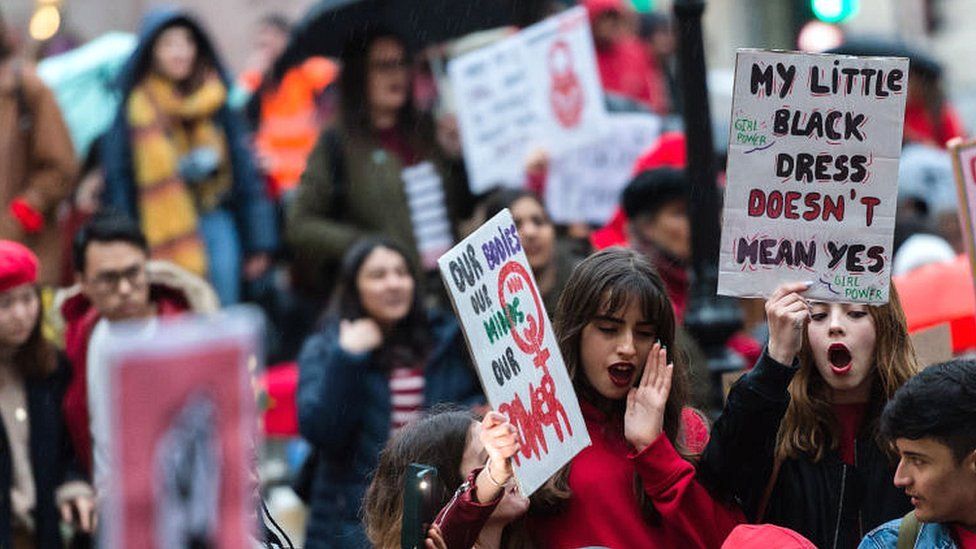Apology to rape victims matters, but it's actions that will count
- Published

Politicians don't like saying sorry, and it's rare to hear.
So the justice secretary's decision to make a major public apology to all victims of rape is an unusual and important moment, acknowledging that the system has let countless victims down, and that the government's efforts to help them seek justice have failed.
The quickest of glances at the slide in the numbers of prosecutions and convictions for rape in England and Wales shows what's happened in the last few years - numbers at a record low, fewer than half the number of cases progressing compared to five years ago.
And on Friday, what Robert Buckland described as the "sobering" review of how bad things have got will be published in full.
His verdict?
That the "sheer scale" of what's gone wrong has left far too many victims, chiefly women, "without any means of redress".
Quite the admission from the man in charge of the legal system.
He certainly can't hide from the numbers, nor the experiences of the victims who, suffering not just the terrible misfortune of being attacked, all too often feel that their experience with the police, CPS or judicial system makes things worse.
The justice secretary will publish plans to try to improve the situation on Friday, including a target to return the level of cases taken to 2016 levels, for victims' phones to be returned much more quickly if they are taken for evidence gathering and to shift the focus away from victims' histories to perpetrators' behaviour.
But he admitted that cuts to the justice system have been part of the problem saying, it was "self-evidently the case that decisions were made" that took money out of the system.
But Mr Buckland, himself a QC who prosecuted many of these kinds of cases, is trying to shift something more fundamental than finding enough cash from the Treasury or introducing new policies.
He is trying to push more than 45 different organisations - police forces, the judiciary, the CPS - to give rape more priority.
He wants to change the culture: the "focus should be on predators, not whether victims should be believed", he says.
Questioning why the terrible clichés about sexual offence victims still pertain, he says: "If your house is burgled people don't start asking you why you did you go out… all those assumptions I'm afraid are far too often not applied when it comes to sexual offences.
"It's not that long ago we lived in a climate where frankly for a woman who seen to be dressed in a certain way, there were terrible assumptions of consent," and he calls for those "damaging misconceptions" to be stamped out.
Culture can't be changed overnight.
And the government is only seeking to return the rates of prosecution to 2016 levels.
So while a new focus on seeking justice for rape may be welcome, there's a real question over whether the scale of ambition really matches the scale of the problem. Labour says the government's record is abysmal.
The apology does matter, a political signal of priority, but campaigners and victims will want to see actual progress - it won't be a matter of forgive and forget.